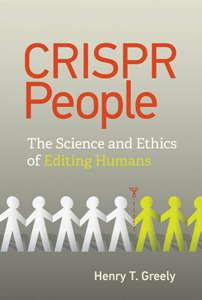 Henry T. Greely, CRISPR People: The Science and Ethics of Editing Humans (Cambridge: The MIT Press, 2021), 380pp.
Henry T. Greely, CRISPR People: The Science and Ethics of Editing Humans (Cambridge: The MIT Press, 2021), 380pp.
When the prestigious journal Science published an article by the Berkeley biochemist Jennifer Doudna about something called CRISPR (June 27, 2012), the scientific community took note. CRISPR was a new tool that enabled scientists to edit the DNA of plants and animals. Hank Greely compares it to the delete-n-replace function in Microsoft Word. Scientists have made two major observations about CRISPR.
First, CRISPR is one of the most revolutionary developments in the entire history of biology. The gene-editing tool, writes Greely, "leapt far beyond the existing tools—perhaps not as far as a chain saw leapt from a stone axe, but close." And so, as many people predicted, Doudna and her colleague Emmanuelle Charpentier eventually shared the Nobel Prize for their pioneering work.
Second, CRISPR was not only simple, fast, and cheap, it was an incredibly powerful tool that could be used for both good and ill, from preventing or curing dreadful diseases like sickle cell anemia to making enhanced designer babies. Doudna has openly shared her "OMG moment" when, soon after discovering CRISPR, she had a nightmare in which a famous scientist came to her and said, "I have somebody very powerful with me who I want you to meet, and I want you to explain to him how this amazing technology functions. So I said, sure, who is it? It was Adolf Hitler wearing a pig's face."
Hank Greely's book describes the shocking rapidity of how CRISPR is moving into a multitude of murky applications. On November 25, 2018, a bombshell of a story broke about how a rogue Chinese scientist named He Jiankui had used CRISPR to edit the DNA of two human embryos, which about a month earlier in October had resulted in the birth of nonidentical twin girls. These twins were the first "gene-edited humans" that we know of. And since this was what is called "germline editing," the changes that were made to the DNA of the twins could be passed on to their descendants.
The consensus of the international science community to the Jiankui story was immediate and nearly unanimous. For Greely, a Professor of Law and Director of the Stanford Center for Law and the Biosciences at Stanford University, the development was "a cross between bad fiction and reckless fiasco." It was "grossly reckless, irresponsible, immoral, [and] illegal." When Doudna learned about He's experiment, she says that she was "just horrified; I felt kind of physically sick." Francis Collins, director of the NIH, described it as "profoundly disturbing." A joint statement of 122 Chinese scientists called it "madness." In fact, on December 30, 2019, the Chinese government tried Jiankui and sentenced him (and two colleagues) to three years in jail. It also fined him $430,000. No one knows where Jiankui is now, nor have scientists heard from him since.
But the genomic genie was out of the bottle, and so Greely explores in depth not just the Jiankui train wreck, but the many broader and controversial questions surrounding the uses of CRISPR. He explains the nuances of gene-editing, explores the complicated ethical questions surrounding the technology, and considers how the scientific community could have done a better job of "self-regulation" (as many as sixty academics might have known about He's experiment before the announcement, including three of Greely's colleagues at Stanford, but nobody spoke up). He also predicts how CRISPR will and won't be used in the near and long term future. In short, he's written the definitive account of the scientific and ethical issues surrounding genome editing. And he's such a fantastic "science explainer" that non-specialists should not be afraid to tackle his book.
For more on this subject see the books by Jennifer Doudna, A Crack in Creation: Gene Editing and the Unthinkable Power to Control Evolution (2017); and the new biography by Walter Isaacson, The Code Breaker: Jennifer Doudna, Gene Editing, and the Future of the Human Race (2021); and the Netflix movie Unnatural Selection (2019), which is about the uses and abuses of CRISPR.
Dan Clendenin: dan@journeywithjesus.net


